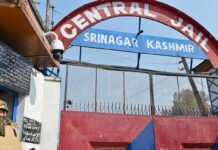A day after India’s 70th I-day, four men were killed in Omar Abdullah’s backyard in Beerwah’s Aripanthan. The killings not only evoked fresh tempers, but also made Gupkar’s last ruler to cry foul. A fortnight after the bloodletting, Bilal Handoo travels to the hamlet to report its gory agony

ARIPANTHAN, Beerwah — Plot thickens in this idyllic hamlet the moment rural folks recall that early morning slaughter happening a day after India’s 70th Independence Day. They look as if emitting fire from their eyes amid pervasive anti-India graffiti. What happened here little over a fortnight ago is still making the mood militant. In hamlet square, masked boys have become a default street force, ensuring zero movement around. Not far away, the four homes are still hosting mourners.
Half open gate of Mohammad Ashraf Wani’s residence in Hazerpora locality carries a banner with a stark message in Urdu: “Do not forget the martyrs.” Inside the residence of this 35-year-old grocer, the mourners are still recalling how the slain would always advise his family: “Do not forget your martyr son.” (The slain’s militant brother was killed by forces in early nineties.)
Among the mourners are Ashraf’s inconsolable mother Raja Bano, his silently grieving widow Farida Akhtar, his 10-year-old daughter Madihah Ashraf and 14-year-old son Ehtisham Ashraf.
Tears are reluctant to dry up. Nobody is speaking — neither Ashraf’s young widow, nor his lamenting mother. There is a woman relative inside who is doing all the talking. “He would have survived that massacre,” the woman says, making the mood even more mournful inside, “had he not battling with his ailing leg.” Ashraf was limping since last year — when a surgery failed to heal his ‘raw nerve’, rendering his left foot lifeless, meaning he couldn’t walk, run like a normal person. Perhaps his medical defect had his destiny written all over it.
Come daybreak of August 16, and this “good Samaritan” limped his way to news stall located in hamlet square to get a newspaper. It was a tense morning—as Aripanthan hadn’t slept the night that had gone by. Among the men Ashraf met that morning at news stall was Sarpanch Haji Ghulam Hassan.
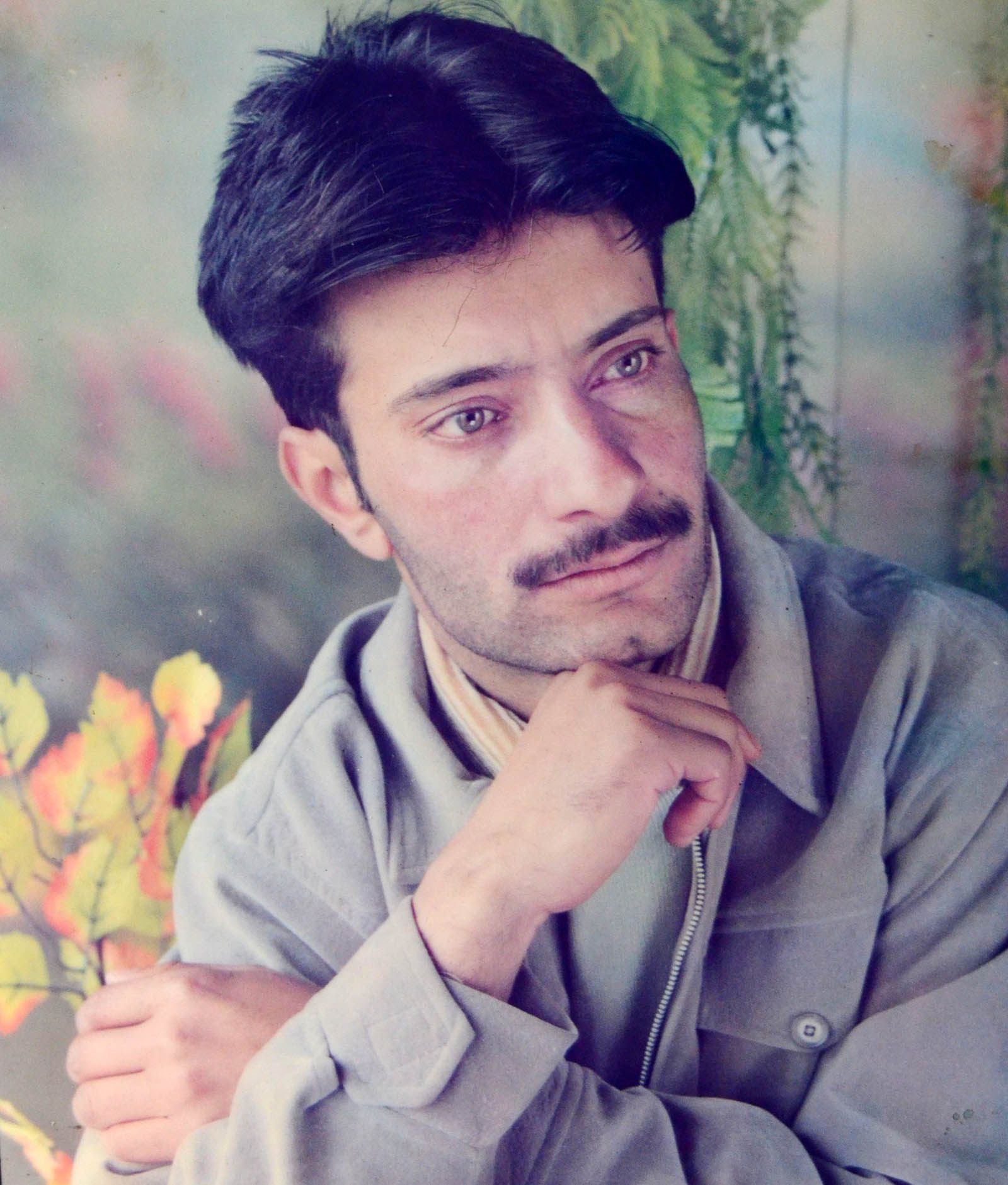
In his late sixties, Hassan is a furrowed man known in entire Aripanthan for his newspaper devotion. “They still come to me for newspapers if they can’t find it at the stall,” says Hassan, basking under morning sun in his courtyard — listening his favourite radio, smoking his beloved Hookah.
But the man hungry for news almost ceased to be on Aug 16 morning. It rather pains him to recall the scene of carnage. “I was out in the morning as usual,” he says, taking a long drag of Hookah. “It was all peaceful. We were hardly eight men out there at news stall when I saw five CRPF vehicles pulling over inside the square. I thought they might pass by, but instead they started pulling triggers at us and suddenly, men around me fell like cards.” Shielded by a shop, Hassan had a miraculous escape.
Lying flat on ground amid flesh-tearing bullets, he saw the grocer Ashraf trying to run away. But the limping man couldn’t cover much ground. “They soon overpowered him and shot him in his heart,” says the Sarpanch, turning off his radio in disgust, taking a manic drag of his Hookah.
At his residence, Ashraf’s mother is leaving everyone in tears, sighs. “What will become of us now, Khudaya?!” Her daughter-in-law flanked by her daughter is silently shedding tears for her departed beloved. Everyone is crying for the “noble soul” who was known for helping the needy. Scenes inside the homes of other three slain men are no different.
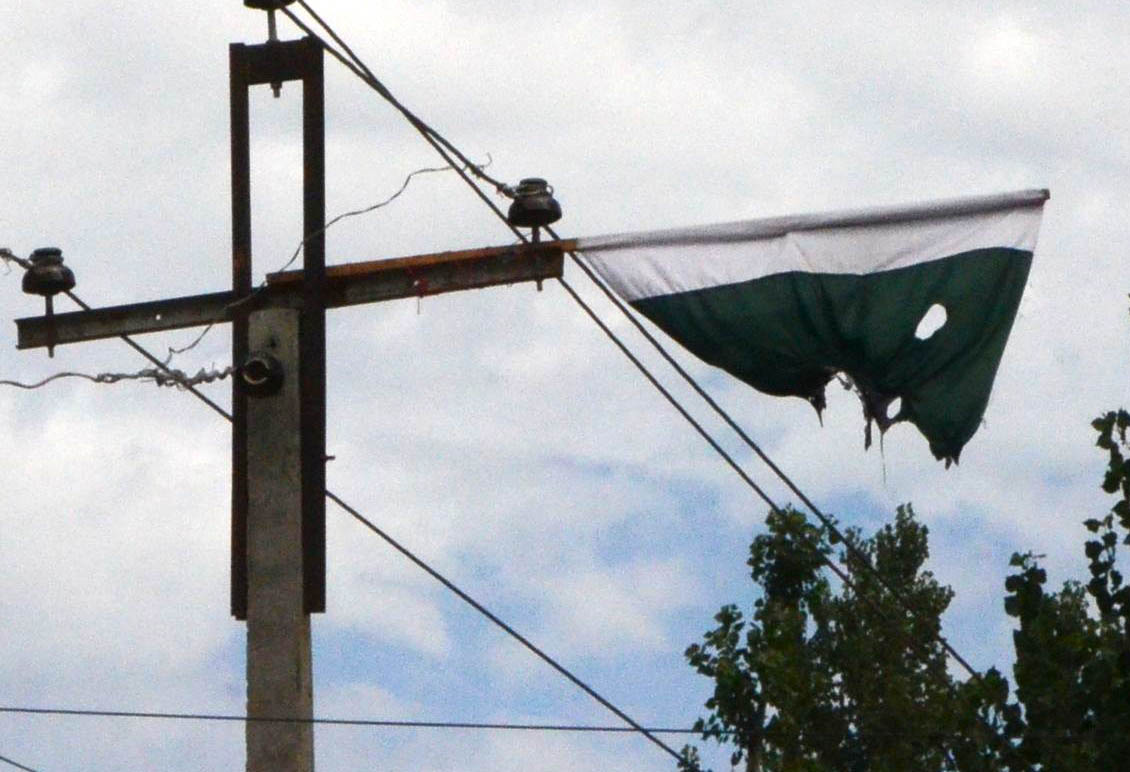
Today Aripanthan looks ragingly devastated with the departure of four gentlemen. In the hamlet square, a half burnt Pakistani flag stands in the backdrop of “Go India, Go” writings on the walls. The flag was raised on an electric pole on August 14. And by the next day when forces were expected to hoist tricolour, the green flag had become an obvious sign of red-face. “Once they failed to take it down,” says Mushtaq, an eye-witness to what happened next, “forces fired pellets at the flag, leaving it half-burnt.”
A day after, a man who risked his life to hoist the Pak flag on the pole was found among the four slain in the square.
The twenty-year-old Javaid Najar has left behind a shattered family. His three teen sisters—Afroza, Hafeeza and Dilshada—and early teen brother have lost both father and mother in him. After losing their parents early in life, it was Javaid who took it upon himself to take care of them. He had sold his little landholding to setup a carpentry workshop near his house to support his siblings. “He wanted to give us a better life,” says sobbing Afroza, as siblings along with their guests huddle inside a room of their modest house. “They just rendered us orphans, once again.”
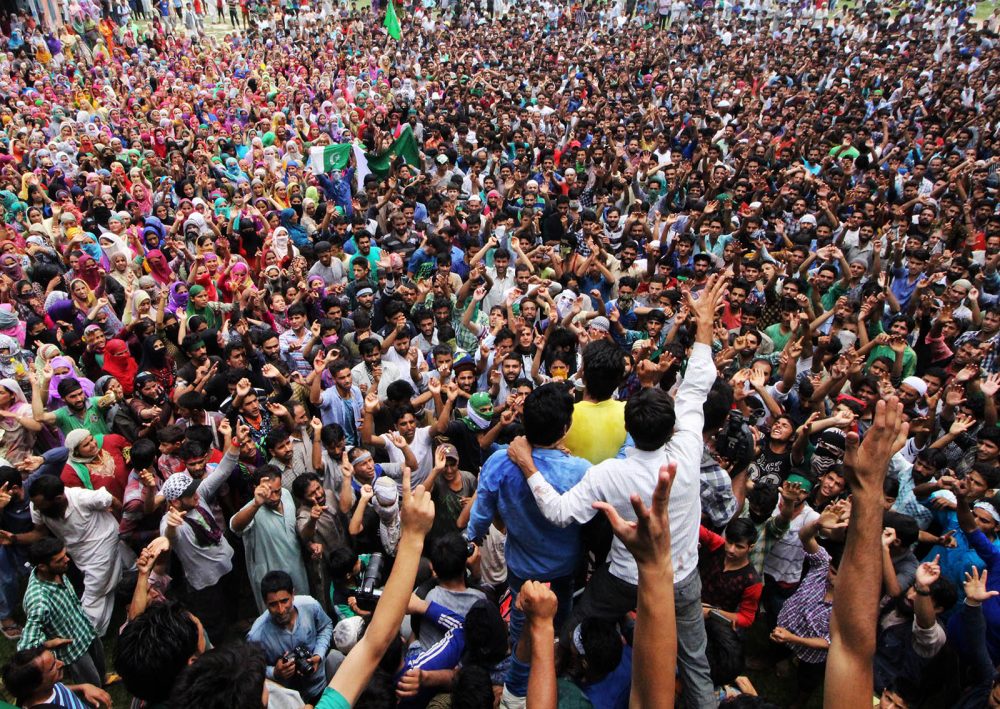
But, a day before gunners could come and slaughter simpletons of Aripanthan, the young dissenters had pushed back an ambulance. It was August 15 and SDM Beerwah Sumeera Naik was spotted inside. “Disguised as patient, she was travelling to a function to unfurl a tricolour,” says Nisar, one of the boys who pushed her back. “After some time, she returned with SHO Magam and unleashed police terror in the hamlet.” Pellets were fired, folks were whacked and windowpanes were shattered in an ensuing assault.
The pellet-hit were treated by a villager Farooq Lone, an X-technician. “We knew transporting pelleted youth for treatment outside meant arrests and beatings,” says Rafiq, a villager. But what Farooq did in Aripanthan on August 15 pissed off certain quarters to an extent of leaving them in a vengeful huff.
By 10:30 that night, the hamlet was thrown out of uneasy calm when shrieks started emanating from Farooq’s home. His wife brought the entire hamlet on streets by drumming up her residential roof in panic. She told the villagers how police and paramilitary men had come to raid her house to detain her husband who wasn’t at home. It alarmed the villagers who shortly sat on night patrol. “That night, hardly anyone slept in Aripanthan,” says Hafeeza, Javaid’s sister. “My brother also went outside and returned home after performing dawn prayers.”
At around 7:30am, he was up and went outside to get morning newspaper. He met Sarpanch Ghulan Hassan, grocer Ashraf and two other neighbours: Javaid Sheikh and Manzoor Lone there. All men except Sarpanch shortly fell to bullets. Hearing gunshots, Javaid sisters came out to his rescue, but could only see him dying before their eyes. Two women also received bullets in the mayhem. “Our neighbour Farooq Ahmad tried to take the dying men of the firing line, but ended up sustaining bullet on his head,” Hafeeza says. “Part of his brain protruded out of his skull. I don’t think he will survive.” There is another youth Tawqeer hospitalised presently. Even he has a bleak chance of survival, they say. Already the villagers have raised black banners atop entrances of the slain in apparent display of collective grief.
But despite the village Sarpanch asserting that killings were done to “terrorise” the peaceful hamlet, they continue to defy logic and reason for the stunned families of slain Javaid Sheikh and Manzoor Lone. Javaid has a father who is yet to come to term to his loss, while Manzoor’s 5-year-old son is only driving his widow crazy by repeatedly asking: “where is Papa?”
However what makes this bloodletting in Aripanthan equally ‘atrociously outrageous’ is its departure from the existing ‘kill pattern’: casualty caused by the “on the loose” force.
That morning, the villagers say, it wasn’t CRPF alone firing at them, but bullets also rained down from other opposite direction, ripping apart human bodies. Who were those gunners?
Javaid sisters say they were army men from nearby RR camp who couldn’t stop feeling trigger happy that morning. “They are the same army men who have claimed forcible ownership of our land, apple and walnut trees.”
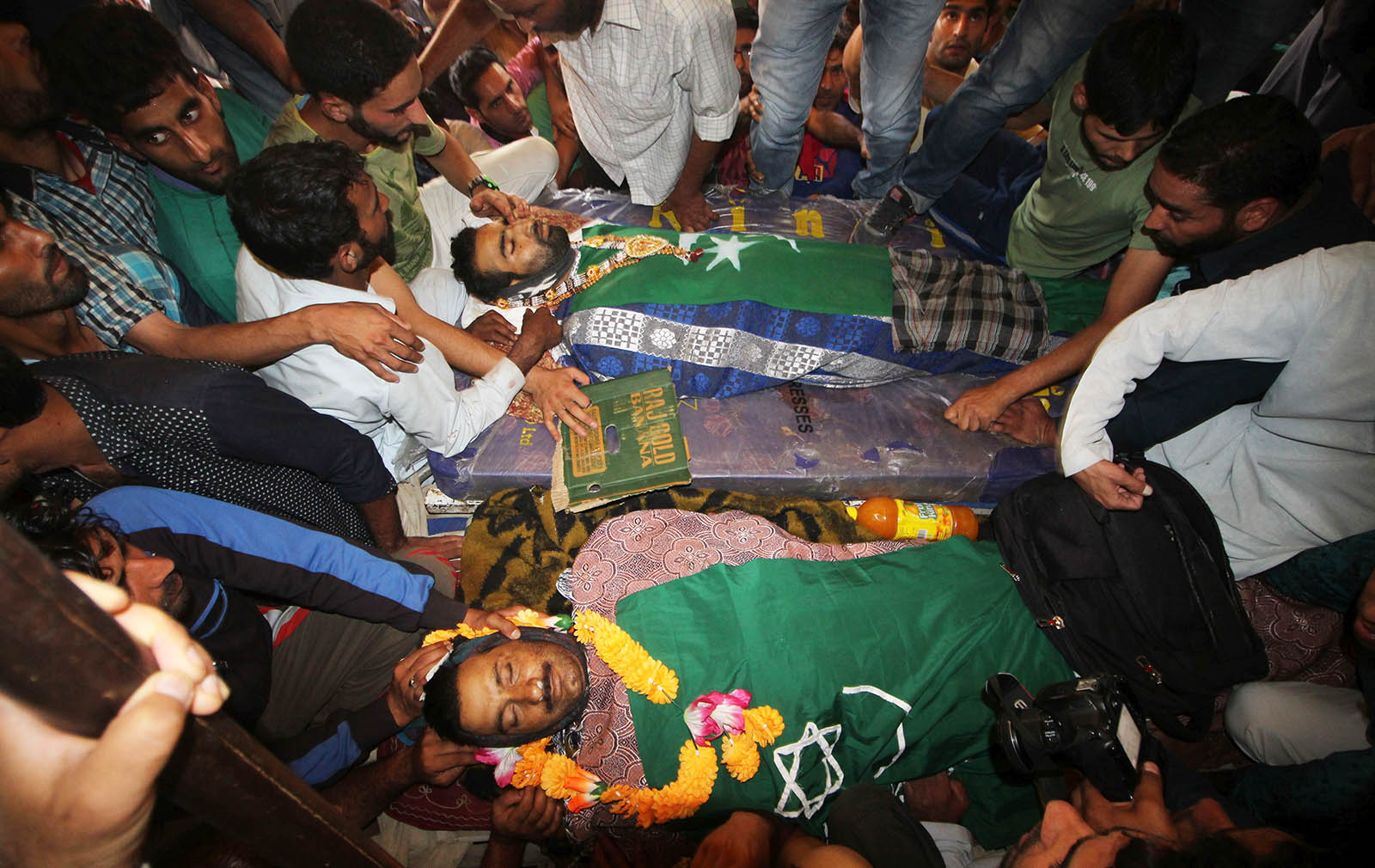
After the gunners evoked massive rage in this peaceful hamlet on August 16, the funeral ground witnessed sea of mourners, chanting: “Aye Moula Deedey…Azadi!” Down in Srinagar’s power street, Gupkar, Aripanthan’s legislator Omar Abdullah cried foul over killings in his backyard. “I have my inputs regarding these sudden killings. Let me verify them first before sharing them.”
With Omar yet to share his facts, the villagers, especially the four families who lost their breadwinners, are now throwing their entire weight behind one final solution to the Kashmir issue. But amid dissent, distress now makes for a clear sign in the hamlet.
Two sisters of the slain Javaid Najar say they were to host their to-be in-laws the day their brother was killed. That day, the guests did arrive in Aripanthan as per schedule — but not to set date for their marriage, but to mourn the loss of their only parent.







